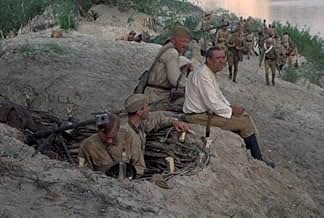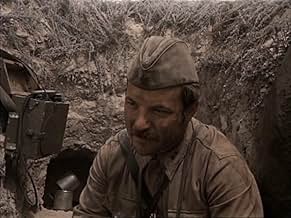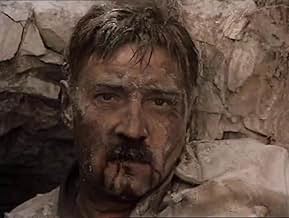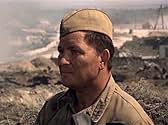Les forces soviétiques battent en retraite face à l'assaut massif des Allemands vers Stalingrad. Une section d'infanterie est chargée de tenir une colline vitale afin de donner à ses camarad... Tout lireLes forces soviétiques battent en retraite face à l'assaut massif des Allemands vers Stalingrad. Une section d'infanterie est chargée de tenir une colline vitale afin de donner à ses camarades le temps de traverser le Don et se regrouper.Les forces soviétiques battent en retraite face à l'assaut massif des Allemands vers Stalingrad. Une section d'infanterie est chargée de tenir une colline vitale afin de donner à ses camarades le temps de traverser le Don et se regrouper.
- Réalisation
- Scénario
- Casting principal
- Récompenses
- 3 nominations au total
- Glikeriya
- (as Lidiya Fedoseeva)
Avis à la une
Screenplay and direction by Sergei Bondarchuk with Vasili Shukshin ( as Poitr Lopakhin ), Vyaheslav Tikhonov ( as Nikolay Strltsov ), Sergei Bondarchuk ( as Ivan Zvyagintsev ), Georgi Burkov ( as Alexandr Kopytovskij ), Nikolai Gubenko ( as the Lieutenant ), Yuri Nikulin ( as Nekrasov ), Ivan Lapikov ( as Poprischenko ) & Nonna Mordyukova ( as Natalya Stepanova ).
The film is based on the book by Nobel Prize winning author Mikhail Sholokhov. The action is set in Russia in July of 1942. The exhausted Soviet army was in full retreat against the might of the invading German Panzer divisions. A decision is to hold a ridge with what is left of an infantry regiment near a small village on the banks of the River Don, to allow the exhausted remnants of the army enough time to withdraw across the river and help fortify Stalingrad for the decisive battle that must come.
The loss of Russian life during the campaign was horrific and while there are some impressive set battle pieces, the film concentrates on the exploits of half a dozen or so soldiers from the shattered regiment, who must not retreat even in the face of the Panzers' greater fire power. The film depicts the thoughts and fears of the individual soldiers in the face of the impending battle, and their thoughts of their Mother Russia as well.
While the battles rage, the viewer is not only shown the inhumanity of the conflict, but also the strong personal bonds that develop between comrades in arms in a deadly conflict. There is also plenty of humor in the script, even if it is often grim and tinged with violent overtones. Vasili Shukshin ( as Poitr Lopakhin ) takes the acting honors, with a character that is as much larrikin as it is proletariat.
This is a great war movie. As with all Sergei Bondarchuk films this is a movie that makes you think and feel by showing you what its like to be a lone man in a huge situation. We get to go inside the heads of the various characters and we see what its like to be in battle. The battle scenes are good as the Russian soldiers simply try to survive the strafing, the bombing and to keep the Germans far enough away that they don't have a good chance at killing them.
In someways this film reminded me of Terrence Malicks's Thin Red Line which used similar techniques at times (for example: subjective camera, manipulation of the soundtrack, disjointed flashback.) Actually this movie reminded me of several other war films produced after its release and I'm curious if film makers like Francis Ford Coppola and others studied copies of this all but impossible to see film when they made things like Apocalypse Now.
As good as the film is it isn't perfect. The film can come off as a bit too "rah rah" for mother Russia at times, even though the film ultimately speaks to the larger question of defending one's own home land. The film also is a bit unfocused in the second half as the film takes some odd turns; then again the second half has some of its most powerful imagery with the young nurse trying to save the wounded man in the bomb crater and the return of one soldier from hospital.
See this movie. Its a great great war war film which only suffers when compared to some of the gems in the Sergei Bondarchuk back catalog of films.
The film concentrates on a small number of individual regimental soldiers fighting within a larger battalion on the Russian Steppes in 1942. We are shown not noble soldiers and distinguished officers of the "glorious" Red Army, but ordinary fighting men. They are hungry, dirty, mentally and physically drained. Also, they are exhausted by their continuous 12 months retreat eastwards towards the river Donn and eventually Stalingrad. The soldiers find harmony in talking about home, family and express their emotions and feeling on the war and what it as done to them as people and their motherland. Location is presented impressively on film; firstly, by using wide angel lenses to capture the vast midst of the Steppe salt marches and corn fields. Secondly, by using close angel lenses to photograph the soldiers as they pass through, rest and interact with nervous civilians in the inhabited dwellings. With a large budget comes large battle scenes. The film shows the merciless destruction of land and villages by Luftwaffe air strikes. Defensive formations containing a whole battalion which is broad in scale and includes large battle formation shoots. The film doesn't over exaggerate when handling the destruction, human cost and horror of battle in its scenes.
The main depiction of war, battle and destruction are powerfully focused on individual soldiers. This film tells a similar story for many veteran soldiers of the second world war, whatever the nationality. Boredom, fatigue, fear, fun, friendship, enemies, orders, pain, loss, distress, death and a longing to go home.
They Fought For Their Motherland" tours the inferno imposed upon the soviet people, both military and civilian, on one side by the advancing, all concurring, disciplined German army. And on the other by years of hardship, personal sacrifice, poverty and living to the ideologist view of the soviet dictatorship. This is not the most graphic of war films in todays standard of brutal, realistic, fast passed combat movies. There are scenes of battle sustained injuries and death. However, this film focuses the humanity of war and what it does to the land, and the opinions of people in occupied nations towards the soldiers who are there to protect them. This is a patriotic film from a Russian point of view, which for many years, as at the time of release, future Russian generations, and other nations that fought in the red army, should look back with pride and honour towards those who fought, and died, for their motherland.
Le saviez-vous
- AnecdotesThis was the last film of Vasiliy Shukshin.
- GaffesDuring the first battle, a few of the Germans are carrying MP44 (or STG 44) assault rifles. This film takes place in summer 1942 and those rifles were not in service in the German army (even as prototypes) until over two years later.
- Citations
Ivan Zvyagintsev: May our love towards our country live in our hearts as long as we live.
Ivan Zvyagintsev: May our hatred to enemy always shine on the tips of our bayonets...
- ConnexionsFeatured in Sergey Bondarchuk (1982)
Meilleurs choix
- How long is They Fought for Their Country?Alimenté par Alexa

























